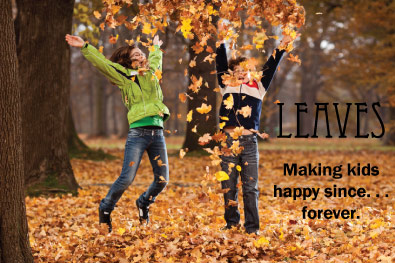You may have seen the ad on TV. A school bus load of kids think they are headed out on a field trip to visit the “forest.” They look bored and can barely respond to the teacher standing in the front who asks them to identify a leaf. Suddenly, the teacher tears off his outer shirt, reveals his red Toys R Us logo wear and announces that the kids are really headed to the toy store for their pick of a free toy. They go nuts with joy and the rest of the ad is about all the fun they have at the store picking out their gift.
For anyone with kids, there is no doubt they love trips to the toy store. But, what about that forest and the otherwise “boring” field trip from which they were saved? What if the bus had, indeed, taken them to the woods?
To begin with, they would have a ton of fun. Park and recreation professionals, parents and teachers know that children come alive when they step out into nature. It may not be loaded with bright and shiny electronic toys that whir and buzz, but the forest has its own sparkling magic and children feel it instantly. The bus to the woods would have caused an explosion of excitement and delight (and noise) when the doors popped open and the kids’ feet hit the ground. Even the most challenged children light up in nature’s embrace. Educators have discovered, for example, that children with autism can change when they spend time outdoors. When they are outdoors they begin to smile, they begin to run and play and they better relate to others and learn. The National Wildlife Federation produced an eye-opening video of children playing (with toys) in nature and having a wonderful time – a great proof of point.

Kids in the woods get other benefits too. They breathe in fresh, clean air and get more oxygen. They can run and play and burn more calories while getting stronger bones and improved muscle tone. Their internal sleep clocks are reset by the bright daylight and they can count on a better night’s rest. And, nested in those woods, is nature’s own unique “toy store.” It has birds, chipmunks, deer, butterflies, crayfish and all kinds of creatures to provide endless fascination. There are rafts of bright flowers, looming tree canopies, branches to climb, stones to kick and brooks to splash through. And, there are trails to exlore and hills to climb accompanied by all the wonderful sounds and smells of forest and field.
When the trip is over and they get back to school having been in these mysterious and wonderful green surroundings they are calmer, happier and more able to do their school work. Some will remember and talk about their time in the woods days, even years, later; long after the Toys R Us outing is a lost retail memory.
Toys R Us is in the business of selling toys. We get that. But, in the school field trip ad, they did not need to send the message that trips to the woods are boring. Toys R Us should put more emphasis on what a child needs to be healthy and happy and instill the important life-lesson of striking balance. The truth is that our kids these days actually need that trip to the forest.
Park and recreation professionals out there, if this message from Toys R Us infuriated you as much as it did us, get involved. Just as Toys R Us is in the business of selling toys, we are in the business of promoting and preserving the value of nature for all people. The message and perception promulgated by this ad is exactly what we are combatting and can change no matter the size or type of park and recreation agency. When we connect more children to nature and instill the lifetime bond to the natural world around them, we prove the nature naysayers wrong. We can and will breakdown the stereotype that nature is “boring.”
If you see this ad on TV, and the kids looking at all the toys in the store, imagine them instead holding a leaf, or a butterfly, or squealing as a chipmunk takes off with a stolen peanut. Toys and toy stores may be a childhood reality, but you have every right to boycott the unsettling idea that a trip to forest and field is neither as much fun nor as important as a shopping trip.
What do you think about the message the Toys R Us ad sends to children? What are some ways you are helping to connect people to nature? What would you tell Toys R Us about the importance of nature for children? Tell us your thoughts in the comments below or join the discussion with us on Facebook and Twitter.
Barbara Tulipane is NRPA's President and CEO.

